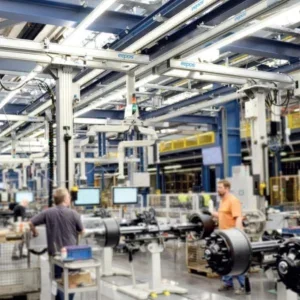Among the technical characteristics as standard in the range of Verlinde PDW open winches are the hoist motors equipped as standard with extended speed range (ESR): slow speeds and high torque favour safety during the shifting of loads. Fast speed in unloaded travel promotes productivity. Trolley drive is regulated with VVF drive for speeds of from 20m/min to 61m/min. The trolley, in its double girder or suspended version, is equipped with two travel mechanisms.
The compact rope lead-offs allow lateral traction in the transverse direction of the trolley. A closed-in structure, they are easy to handle and freely rotate about 360 degrees. The pulleys require less rope lead-off and fewer wire rope turns per cycle, so the lifespan of the high strength steel wire rope is increased. Likewise, the rail spacing is designed to optimize the quantity of steel ropes and their dimensions.
The flange-mounted motor eliminates the risk of misalignment between the gear box and the motors. The winch motors and travel motors are of the squirrel cage type, specially designed and manufactured for overhead cranes. The unique design of the gear box and lifting drum limits deformation of the drum and trolley structures and does not cause misalignment between the drum and the gear box thus limiting fatigue breakage and increasing the service lifespan of the equipment.
The modular design of the lifting mechanism provides a compact structure with rail spacing optimized according to the height of lift required by the application. The lifting mechanism is supported by an original floating suspension which eliminates bending forces due to the weight of the load. A fatigue analysis of the structure has led to an innovative design of the mechanism's support system that eliminates internal stress. This hoist unit is fitted with an electrohydraulic thruster disc brake as standard whose torque is at least 200% with a rated load.
The adjustable bottom limit switches with automatic reset prevent hook overtravel. Slow-down or stop functions are planned for transversal travel of the trolley. A safety limit switch for hoisting motion in the upward direction guarantees standard operation of the top mechanical limit switch. Buffer stops are planned with the end carriages. Each winch is fitted with a load limiter which halts hoisting when the rated load is exceeded to prevent overloading.
A protective bar against overlap for the wire rope drum is available as an option for all configurations. Lastly, a diagnostic unit regularly monitors the SWP (safe working period) which is the effective lifespan of a hoist in complete safety within the limits of its duty classification.






